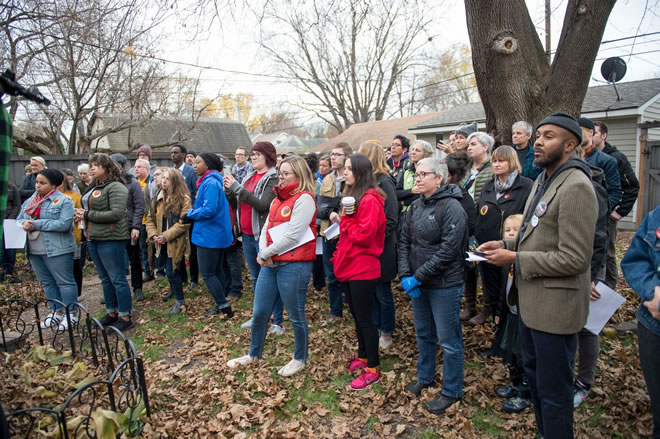The congresswoman and I have a lot in common — but not her stance on Israel.

Representative Ilhan Omar, Democrat of Minnesota, on Capitol Hill in January.CreditCreditJim Watson/Agence France-Presse — Getty Images
 |

By Thomas L. Friedman
Wednesday, March 06, 2019
I’ve been watching with more than a little interest the controversial statements about Israel and the Israel lobby by Ilhan Omar, a freshman Democratic congresswoman from the Fifth District of Minnesota, because it turns out that we have a lot in common — up to a point.
The first thing we have in common is that I was raised in the Fifth District of Minnesota, specifically the Minneapolis suburb of St. Louis Park. I lived there until I was 20. It was a freaky place — a crazy mix of Minnesota Jews (we called ourselves “the Frozen Chosen’’) and Scandinavians that produced a uniquely tolerant civic culture and an interesting group of neighbors: Al Franken, the Coen brothers, Peggy Orenstein, Norm Ornstein, Michael Sandel, Sharon Isbin, Marc Trestman and lots of others you can find on the St. Louis Park Wikipedia page. Our little town was immortalized in the Coen brothers’ 2009 movie “A Serious Man.’’
I still feel very close to the community there and go home often. St. Louis Park welcomed Jews who wanted to get out of the inner city of Minneapolis back in the 1950s — when other suburbs still had restrictions on selling homes to “Hebrews.’’ So I was proud to see St. Louis Park also welcome Muslim Somali refugees like Omar a half-century later, and then elect her to Congress.
The other thing that Omar and I have in common, as others have noted, is that we both don’t like the American Israel Public Affairs Committee (AIPAC) — the organization at the center of the Israel lobby — and have spoken in very blunt language about its strong-arm political tactics.
But that is also where our differences begin.
I don’t like AIPAC because I strongly believe in the right of the Jewish people to build a nation-state in their ancient homeland — a nation-state envisaged by its founders to reflect the best of Jewish and democratic values. And I believe AIPAC for many years has not only become a rubber stamp on the right-wing policies of Prime Minister Benjamin Netanyahu, which has resulted in tens of thousands of Israeli settlers now ensconced in the heart of the West Bank, imperiling Israel as a democracy. AIPAC has also been responsible for making support for Israel a Republican cause, not a bipartisan issue, which poses a real danger to Israel’s support in America in the long run, and particularly on college campuses.

Prime Minister Benjamin Netanyahu of Israel at the 2018 Aipac Policy Conference.CreditJose Luis Magana/Associated Press
I dislike AIPAC because I am devoted to Israel as a Jewish democracy and because I believe that only a two-state solution between Israelis and Palestinians can ensure that. Given how AIPAC has let itself become the slavish, unthinking tool of Netanyahu, who opposes a two-state solution, I believe AIPAC works against Israel’s long-term interests.
AIPAC is a self-appointed lobby that does not represent my feelings as an American Jew. But neither does Representative Omar.
Everything I have heard from her leads me to conclude that she dislikes AIPAC because she dislikes Israel, because she does not really believe the Jewish people have a right to an independent state in their ancestral homeland. She seems to support the Boycott, Divestment and Sanctions movement against Israel, known as B.D.S.
When Omar was asked at an August primary debate held in a St. Louis Park synagogue about her stance on B.D.S., she said that the movement was “not helpful in getting that two-state solution,” Haaretz reported on Nov. 14.
But after she was elected, Muslimgirl.com reported that on Nov. 11, her campaign told a reporter for the website that “Ilhan believes in and supports the B.D.S. movement and has fought to make sure people’s right to support it isn’t criminalized. She does, however, have reservations on the effectiveness of the movement in accomplishing a lasting solution.”
According to Haaretz, her campaign confirmed that she had voted against an anti-B.D.S. bill while she was a member of the Minnesota House of Representatives, explaining that she was inspired by how B.D.S. had worked to undermine apartheid in South Africa. “I don’t want to be part of a vote that limits the ability of people to fight towards that justice and peace,” she had said.
I am not a B.D.S. supporter. The movement’s main website says that it “does not advocate for a particular solution to the conflict and does not call for either a ‘one state solution’ or a ‘two state solution.’” Rather, it calls for ending the Israeli “occupation and colonization of all Arab lands and dismantling the Wall, recognizing the fundamental rights of the Arab-Palestinian citizens of Israel to full equality” and “respecting, protecting and promoting the rights of Palestinian refugees to return to their homes and properties as stipulated in UN resolution 194.”
By being specific about the rights of Palestinians to return to their home and not unequivocally committing to a two-state solution, the movement leaves me and many others to believe that B.D.S. is just code for getting rid of the state of Israel. I do not believe in passing laws against B.D.S. — people can boycott whomever they want — but I do believe it is not a helpful movement at all. And I believe Omar’s waffling on the issue, depending on her audience, is equally unhelpful and troubling.
[Hours after this column was published, Omar’s spokesman Jeremy Slevin called me and shared this statement: “As she has said before, Representative Omar supports a two-state solution, which allows for both Israelis and Palestinians to have their own sanctuaries and self-determination.”]
If she thinks the only reason that Americans support Israel is because of AIPAC and campaign contributions, she is dead wrong. Americans’ affinity with Israel is rooted in a respect for Israel’s ability to maintain a democracy, albeit with flaws, in a sea of autocratic regimes; it is rooted in a Judeo-Christian religious affinity; and it is rooted in respect for Israel’s contributions to technology, medicine and science. AIPAC is the beneficiary of that support, not the cause of it.
But AIPAC has abused that privilege. And it is utterly fooling itself if doesn’t understand that there are more than a few Americans, especially on college campuses but not only there, who are enjoying watching Omar give it a punch right in the face. She is saying something others want to say but are afraid to do so — including some members of Congress, I am sure.
Why? Maybe it’s because they watched how President Barack Obama put together a $40 billion, 10-year military aid package for Israel — a high-tech powerhouse that is not poor — and rather than receiving effusive thanks from Netanyahu, Obama was criticized by Bibi and his cat’s paw, the Republican Senator Lindsey Graham, as “not generous enough,’’ because it required that aid to be spent purchasing American arms, benefiting our workers, not on Israeli-made arms. AIPAC went along with Netanyahu’s ungratefulness.
As Haaretz reported on July 28, 2016, “Last week, Graham visited Israel and met with Prime Minister Benjamin Netanyahu. The prime minister said he was unhappy with both the level of aid the Obama administration was offering in the new deal and the conditions the administration was attaching to it.’’
With AIPAC’s support, Netanyahu also got the Republican House to invite him to give one of America’s highest honors — a speech to a joint meeting of Congress — over the objections of President Obama. Netanyahu used the opportunity to castigate the White House at the height of both the Iran negotiations and Netanyahu’s own re-election campaign. That really made me mad as an American. Netanyahu used our Congress to attack our president and further his re-election campaign. No other foreign leader would have dared to do that.
Around 60 Democrats boycotted the speech, saying it was an overreach by Speaker John Boehner, Netanyahu and AIPAC — one also designed to make it look as if Republicans were more pro-Israel than Democrats.
According to Talking Points Memo, the Israelis and Republicans worked out the details of Bibi’s congressional speech “without notifying the White House,” so that, Boehner said, “there was no interference” from the administration. Not only did that violate diplomatic protocol — an opposition party working directly with a foreign government — but of political protocol as well, with congressional Republicans developing their own foreign policy independent of, and at odds with, the White House.
Plenty of Americans resent that kind of overreach. And it was enabled by AIPAC. On Feb. 28, 2015, The Washington Post reported: “Worried that lawmakers might boycott the speech altogether, a board member of the American Israel Public Affairs Committee prodded local AIPAC activists to apply pressure on Rep. Chris Van Hollen (D-Md.) to attend.’’
But I come back to Omar. She is a brand-new member of Congress. She is free to raise any issues she wants. And one issue she seems to have seized on is the alleged dual loyalty of Jews to America and Israel. I am not dual loyal. I always put America first, but I want to see Israel thrive — just like many Irish-Americans, Italian-Americans, Indian-Americans and others feel about their ancestral homelands.

Minneapolis residents at a November campaign event for Ms. Omar.CreditCraig Lassig/EPA, via Shutterstock
When I see that dual-loyalty charge coming from a congresswoman who first signaled opposition to B.D.S. and then support for it, when I see it coming from a congresswoman who has never been to Israel, when I see it coming from a congresswoman who, to my knowledge, has never criticized the Palestinian leadership for its corruption and failure — time and again — to seize on peace overtures from Israeli leaders who, unlike Netanyahu, actually wanted to forge a two-state solution, when I see it coming from a congresswoman who seems to be obsessed with Israel’s misdeeds as the biggest problem in the Middle East — not Iran’s effective occupation of four Arab capitals, its support for ethnic cleansing and the use of poison gas in Syria and its crushing of Lebanese democracy — it makes me suspicious of her motives.
So let me end where I started. Ilhan Omar represents, among other neighborhoods, a significant and liberal Jewish community — my hometown. I can tell you that a vast majority of Jews there would be proud if their congresswoman used her links to American Jews and Muslims to be a bridge builder for peace in the Middle East and America, not just another AIPAC/Israel basher. She is young and very new to the national spotlight. Friends of mine back home tell me her humanistic instincts are impressive and authentic. I don’t know if it’s her or her advisers, but she’s gotten herself into a bad place — a huge missed leadership opportunity.
Which only reinforces a fundamental rule I have: I love the Israelis and the Palestinians, but God save me from their American friends. When they recreate and fuel their conflict here in America, and on college campuses, they only sow more division, distrust and make things worse. And that’s the last thing the good people in Israel and Palestine need.
The Times is committed to publishing a diversity of letters to the editor. We’d like to hear what you think about this or any of our articles. Here are some tips. And here’s our email: [email protected].
Follow The New York Times Opinion section on Facebook, Twitter (@NYTopinion) and Instagram.
Thomas L. Friedman is the foreign affairs Op-Ed columnist. He joined the paper in 1981, and has won three Pulitzer Prizes. He is the author of seven books, including “From Beirut to Jerusalem,” which won the National Book Award. @tomfriedman